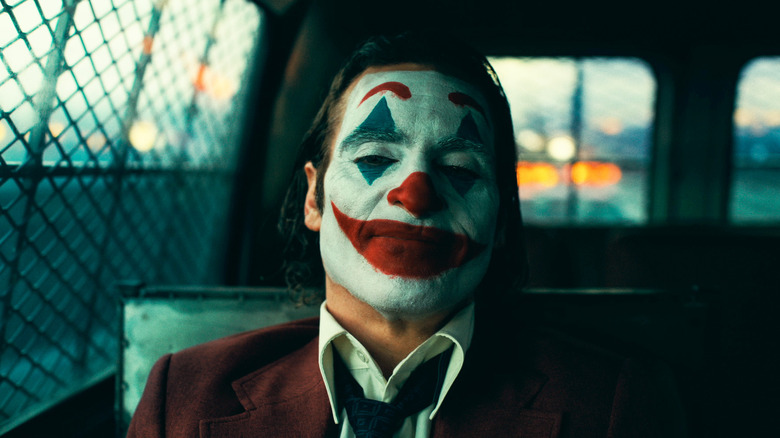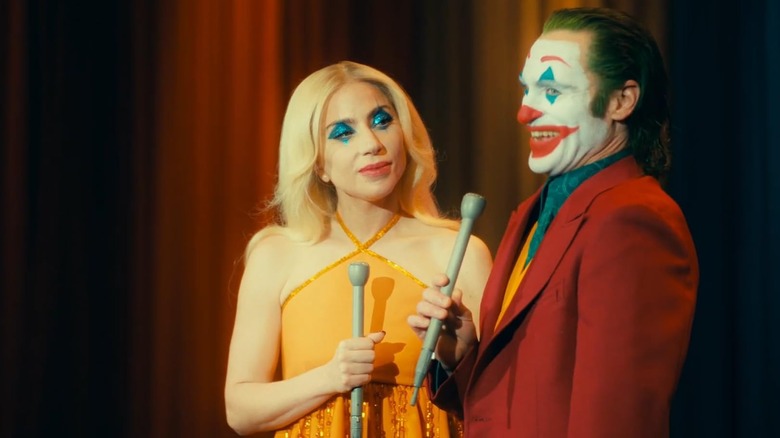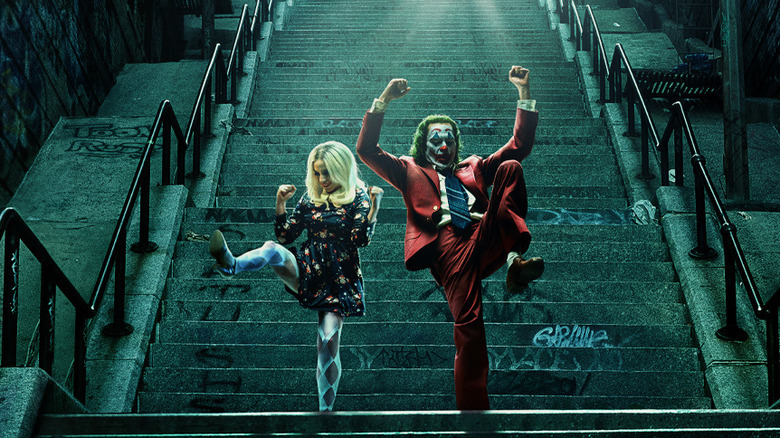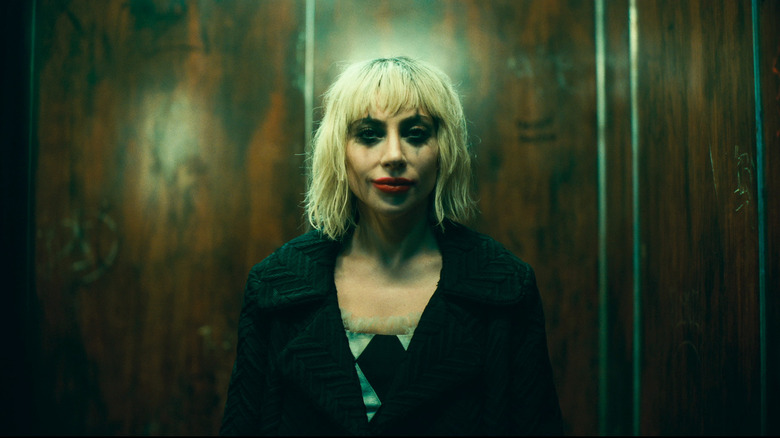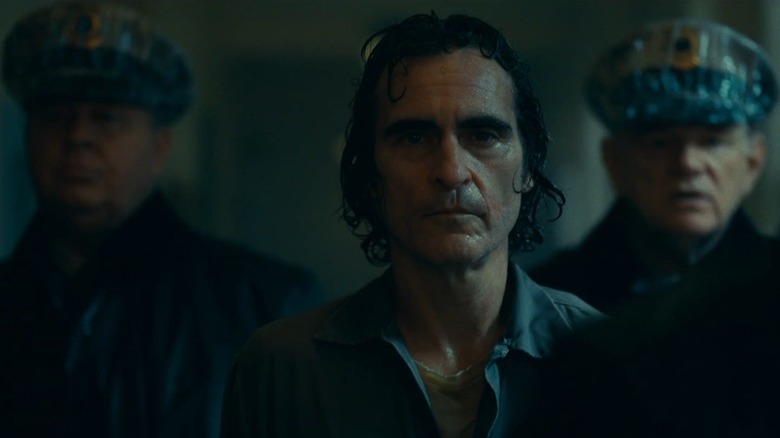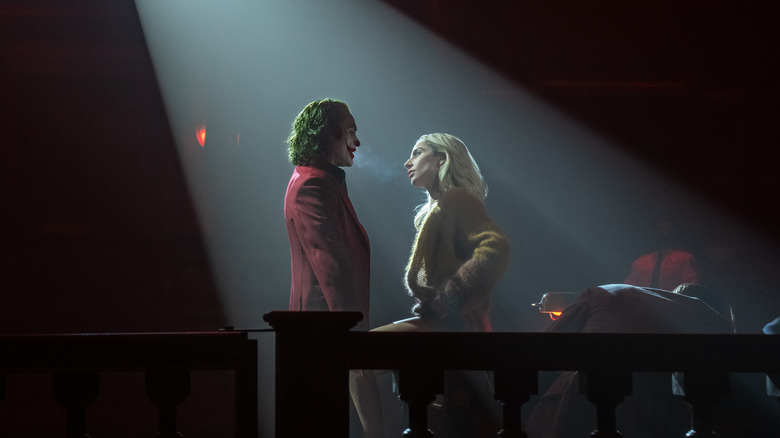5 Reasons Why Joker 2 Flopped At The Box Office
Sometimes, a movie catches us all by surprise and underperforms against expectations. Box office tracking has been a little less accurate than it used to be, but we're usually at least in the ballpark when it comes to what a given movie is going to do on opening weekend. All of this to say that "Joker: Folie a Deux," aka "Joker 2," just experienced a brutal opening that comes as a straight-up shock to the industry. In the realm of blockbuster filmmaking, this is about as bad as it gets. Not just because of the raw opening number, but because what comes next is probably going to be even uglier.
Director Todd Phillips' "Joker" sequel opened to just $37.8 million over the weekend. That's even lower than "Morbius" in 2022. The only good news is that it did indeed top the charts in the U.S. The bad news is that just a couple of weeks ago, Warner Bros.' latest film inspired by the world of DC Comics was expected to make at least $70 million — and that had been revised down from even more optimistic early forecasts. Things started bad when "Folie a Deux" had a rough Thursday night, and it just kept getting worse as the weekend rolled on.
The sequel also pulled in $81.1 million overseas for a $118.9 million global start. That was well below the first film, which pulled in $152.2 million in its overseas launch. This is all especially difficult to process, given that the original "Joker" opened to more than $96 million before going on to make more than $1 billion worldwide, becoming the highest-grossing R-rated movie ever up to that point. Needless to say, the sequel won't be getting anywhere near the $1 billion mark — not by a long shot.
So, what went wrong here? How did Phillips miss the mark so badly? How did Warner Bros. fail to deliver what should have been an easy home run? We're going to go over the biggest reasons that "Joker: Folie a Deux" failed at the box office. Let's get into it.
The response to Joker: Folie a Deux was downright brutal
There is no getting away from the fact that both critics and audiences alike broadly disliked "Joker: Folie a Deux." We're not just talking about the usual level of "this wasn't for me" bad reviews; many of the people who didn't like the movie actively hated it. The film currently carries a 33% critical approval rating on Rotten Tomatoes to go with a lousy 31% audience approval rating. Not even movies like "Madame Web" or "Morbius" scored anywhere near that low. It's also worth pointing out that "Morbius" opened to $39 million in 2022, just to add more context to how bad things are for DC's latest.
The bigger elephant in the room is the historically bad D CinemaScore. This is the first major studio comic book movie ever to earn a D. This is a polling of real moviegoers sharing their thoughts on the film. A score of D represents an utter rejection of the movie, suggesting downright hostile word of mouth. Not only will people not recommend it to their friends, they will probably try to ward them off from seeing it. It's that bad. This is uncharted territory for this type of movie.
Sure, there are those who liked the film. /Film's Bill Bria called it "the most compelling comic book movie of the year" in his 8 out of 10 review. But those positive reactions feel few and far between, and they certainly won't be enough to turn the tide. Blame it on the musical numbers, blame it on any number of things, but what's crystal clear is that the resulting film was not what any meaningful number of potential ticket buyers wanted to see.
Too much time has passed since Joker
The original "Joker" came out five years ago. In most cases, waiting five years for a sequel to a major blockbuster to come out is not going to help matters. In recent years, we've seen this happening more and more. In this case, it almost certainly hurt the bottom line. The impact of "Joker" becoming a pop culture phenomenon and an unexpected Oscar-winning, divisive sensation has long since worn off. Ideally, WB would have had this out in 2022. That didn't pan out.
But Warner Bros. certainly can't be blamed for the timing issue. Phillips and Joaquin Phoenix weren't initially contracted for a sequel, so those gears weren't turning right away. Beyond that, the pandemic all but shut down Hollywood for months on end starting in 2020. Plus, we had last year's SAG and WGA strikes contributing to another work stoppage for months, which delayed many films into 2024 and 2025. All of this contributed to the sequel taking years to make its way into the world. In that time, much changed, and not in any way that benefited "Folie a Deux." From people being more picky about going to the movies in general to comic book movies no longer being automatic hits, the delay provided this sequel with a much steeper hill to climb.
The state of comic book cinema isn't what it once was
Linked to the five-year gap, a big problem that "Joker: Folie a Deux" faced is the massive difference in the way general audiences approach comic book movies now. In 2018 and 2019, Marvel and DC could do no wrong. "Venom" became an $856 million smash against terrible reviews (in no small part thanks to a huge showing in China). "Captain Marvel" made more than $1.1 billion, which at the time felt effortless. "Aquaman" made $1.15 billion worldwide, still ranking as the biggest DC movie ever. Those all feel like distant memories now.
The state of comic book cinema is now much more perilous. Any film not seen as essential has had a tough time finding pre-pandemic levels of success. Something like "Spider-Man: No Way Home" is the exception rather than the rule. DC had "Black Adam," "Shazam! Fury of the Gods," "The Flash," and "Blue Beetle" all flop in succession. "Aquaman and the Lost Kingdom" also ranked as a huge disappointment. Marvel has faced similar catastrophes with the likes of "The Marvels" and "Ant-Man and the Wasp: Quantumania." Yet Marvel has also had huge hits like "Deadpool & Wolverine" to help balance the scales.
The point is that "Joker 2" was probably never going to match its predecessor, even under the best of circumstances. Given the historically lousy reviews, the circumstances are now anything but ideal. As the movie exists, it never really stood a chance.
Joker: Folie a Deux was way too expensive
The other elephant in the room when it comes to assessing "Joker: Folie a Deux" is its budget. The first "Joker" became a hugely profitable success story in no small part because Phillips made the R-rated, super dark tale of Arthur Fleck for $60 million. The movie didn't need to make anywhere near $1 billion to break even. Warner Bros. wisely budgeted it at a level where the DC branding could almost serve as an insurance policy of sorts. Unfortunately, Phillips and Warner Bros. weren't nearly as fiscally responsible this time around.
"Folie a Deux" carries a budget in the $200 million range, which is on the same level as many more effects-heavy, PG-13 superhero films. While the movie doesn't quite need to make $1 billion to break even, it sure as heck needs to make a lot more than $40 million on opening weekend. Granted, Phillips and Phoenix wanted (and deserved) bigger paydays for the sequel. Lady Gaga, who plays a version of Harley Quinn, also doesn't come cheap. But does that account for an extra $140 million? Not exactly.
Warner Bros., for its part, desperately wanted a sequel. Even so, someone should have raised a red flag when Phillips wanted a budget that big for such an offbeat concept. If the idea is to let the filmmaker execute a vision unchecked to some degree, then the budget should reflect the risk involved. Hollywood has been contending with franchise budget issues for years, so this is nothing new. It's just a shame that a sequel to a movie that bucked that trend succumbed to the pitfalls of modern blockbuster filmmaking anyway.
It's not just a sequel nobody asked for, it's a sequel for nobody at all
In 2019, when "Joker" first hit theaters, it felt like a bold, maybe even dangerous movie. There was a great deal of controversy surrounding the film's depiction of violence. There was a great deal of praise for Phoenix's lead performance, which ultimately netted him a Best Actor Oscar. Phillips proved that he was more than just the guy who made comedies like "The Hangover." DC showed a willingness to think outside the box, distancing themselves from Marvel in at least one respect. It may have been a divisive movie, but there was very clearly an audience for it.
The difference with "Folie a Deux" is that Phillips made a movie that runs counter to what many people liked about the first film. He also certainly didn't make a film that was going to court viewers who weren't already on board. Yes, Lady Gaga gets some attention. Turning it into a musical, though? That's always going to be a tough sell. The larger point is that Phillips pitched and made a sequel that seemingly wasn't for anyone. Warner Bros. let it happen, and now they're paying the price.
Fans shouldn't dictate the content of franchise films, but that doesn't mean studios should abandon good business sense along the way, either. Taking risks with IP is necessary for the long-term viability of that IP. But without strong checks and balances along the way, bad things can happen — and this is pretty much as bad as it gets.
"Joker: Folie a Deux" is in theaters now.
